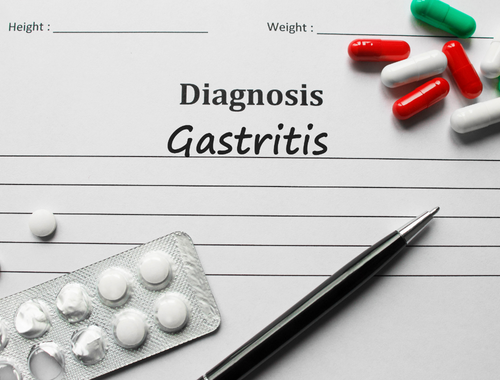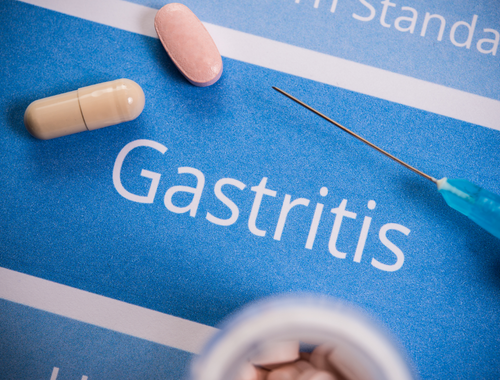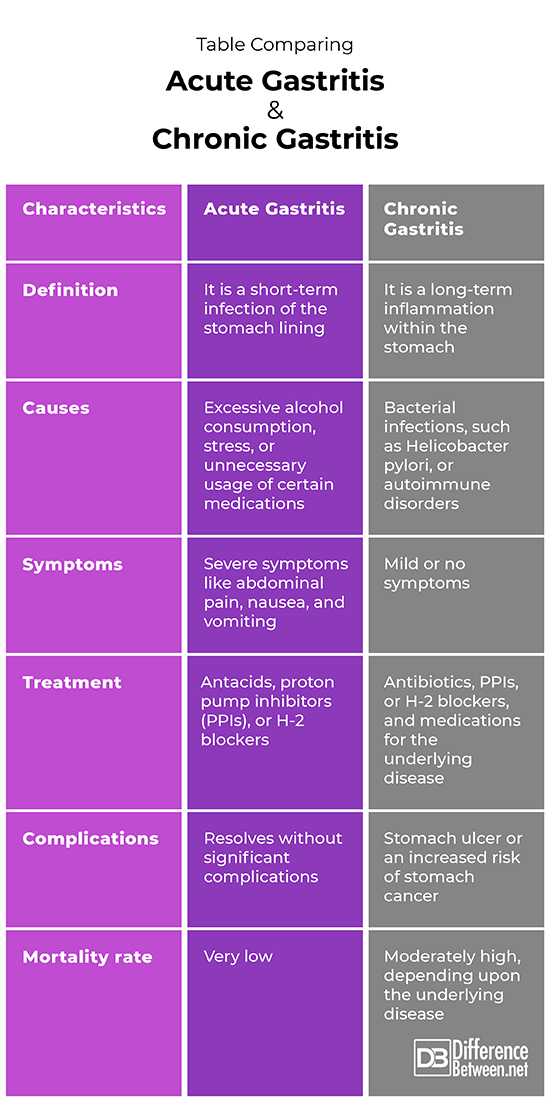Difference Between Acute Gastritis and Chronic Gastritis
Gastritis is a medical condition characterized by inflammation of the stomach lining. The inflammation can either occur suddenly and is usually short-lived or lasts for a long time, leading to more severe complications. The classification of gastritis depends on the time course of the disease.

What is Acute Gastritis?
Definition:
Acute gastritis is a medical condition characterized by the sudden inflammation of the stomach lining. It is accompanied by typical stomach and bowel problems that usually resolve in a few days through medication. The inflammation could involve the entire stomach or a particular region.
Causes and risk factors:
Various factors can cause acute gastritis. The most common factor is a bacterial infection from contaminated food or water sources, usually by Helicobacter pylori. The other factors involve nonsteroidal anti-inflammatory drugs (NSAIDs), excessive alcohol consumption, severe stress, autoimmune disorders, and direct injury to the stomach lining. Risk factors include alcohol abuse, chronic use of NSAIDs, smoking, older age, previous stomach surgery, high-stress levels, and prior history of gastric ulcers.
Diagnosis:
Diagnosing acute gastritis involves taking a medical history, physical examination, and diagnostic tests. The diagnostic tests include endoscopy, blood test, stool test, and breathing test.
Symptoms:
The symptoms of acute gastritis may vary in severity and duration, including discomfort or pain in the abdomen, nausea, vomiting, loss of appetite, belching or bloating, indigestion, hiccups, black or black or tarry stools, blood in vomit, and weakness.
Complications:
Complications of acute gastritis include peptic ulcers, gastrointestinal bleeding, gastric outlet obstruction, stomach or intestines perforation, and malnutrition.
Treatment:
Based on the underlying condition, treating acute gastritis involves medications such as antacids, proton pump inhibitors (PPI), and histamine H-receptor antagonists (H2 blockers). Dietary changes, lifestyle modifications, rest, and hydration are required to relieve symptoms and heal the stomach lining. Treatment of other causes is necessary if they are the reason behind presenting symptoms of gastritis like Crohn’s disease.

What is Chronic Gastritis?
Definition:
Chronic gastritis is a long-term inflammation of the stomach lining that can persist for months or even years. It represents the phenotypes of a life-long ailment. It usually begins in childhood as a simple inflammation, remains benign for years, and gradually becomes active through a stepwise progression into various stomach regions.
Causes and risk factors:
Multiple causes of chronic gastritis include Helicobacter pylori infection, autoimmune disease in the stomach, long-term usage of specific medications like nonsteroidal anti-inflammatory drugs (NSAIDs) and corticosteroids, chronic stress, alcohol abuse, and bile reflux. The risk factors of chronic gastritis are age, family history of gastritis, smoking, high salt or pickled food diet, and chronic stress.
Diagnosis:
The diagnosis of chronic gastritis involves any medical history of the patient, physical examination, blood tests to detect H. pylori infection or anemia, imaging studies using computed tomography (CT) or magnetic resonance imaging (MRI), and endoscopy.
Symptoms:
The symptoms of chronic osteomyelitis can vary depending on the severity and duration of the infection. However, they may include pain in the affected limb, swelling associated with redness and tenderness, limited movement of the limb, drainage from the affected limb, fever due to infection, and weakness.
Complications:
Chronic gastritis may or may not show symptoms in individuals with stomach lining inflammation. However, some symptoms include abdominal pain, bloating, nausea, vomiting, indigestion, loss of appetite, unintentional weight loss, and anemia.
Treatment:
Treatment for chronic gastritis typically involves antibiotics to eliminate H. pylori infection. Medications could also include H2-blockers and proton pump inhibitors (PPIs) to relieve symptoms. Moreover, dietary changes, stress reduction, and avoidance of irritants are required to ensure a reduced risk of irritation to the stomach lining. Additionally, underlying conditions like autoimmune gastritis should be treated to manage chronic gastritis.
Difference between Acute Gastritis and Chronic Gastritis
Definition
Acute gastritis is a short-term inflammation of the stomach lining that is often caused by lifestyle factors or medications, lasting only a few days. In contrast, chronic gastritis is a long-term inflammation often caused by underlying medical conditions or infections, which can last for months or even years.
Causes
Acute gastritis is often caused by factors such as excessive alcohol consumption, stress, or the use of certain medications. Chronic gastritis is often caused by bacterial infections such as H. pylori or autoimmune disorders.
Symptoms
Acute gastritis often causes sudden and severe symptoms, such as abdominal pain, nausea, and vomiting. Chronic gastritis may cause mild symptoms or no symptoms at all.
Treatment
Antacids, proton pump inhibitors (PPIs), or H-2 blockers may reduce stomach acid and relieve acute gastritis symptoms. For chronic gastritis, medications may include antibiotics (if the cause is H. pylori infection), PPIs or H-2 blockers, and medications to treat underlying conditions contributing to the inflammation.
Complications
Acute gastritis usually resolves on its own and does not typically lead to complications. Chronic gastritis, on the other hand, can lead to the development of stomach ulcers or an increased risk of stomach cancer.
Mortality rate
Acute gastritis typically does not lead to severe complications, can be managed with medications and lifestyle changes, and has a very low mortality rate. Chronic gastritis may lead to stomach ulcers and increases the risk of developing stomach cancer. The mortality rate varies in chronic gastritis depending on the underlying disease.
Table comparing Acute Gastritis and Chronic Gastritis

Summary of Acute Gastritis and Chronic Gastritis
- Chronic gastritis is a short-term stomach inflammation usually caused by excessive alcohol consumption, stress, or excessive usage of certain drugs.
- Chronic gastritis is a long-term stomach inflammation, lasting for months or even years, mainly caused by a bacterial infection of H. pylori.
- Chronic gastritis is more severe than acute gastritis, potentially increasing the risk of stomach ulcers or cancer.
FAQ
How do I know if I have chronic or acute gastritis?
Acute gastritis symptoms often develop suddenly, is more severe, and may include abdominal pain, nausea, vomiting, and loss of appetite. Chronic gastritis symptoms may develop slowly over time, is less severe, and may include mild abdominal pain, nausea, and bloating.
Can acute gastritis turn into chronic gastritis?
Acute gastritis can turn into chronic gastritis if the underlying cause of the acute gastritis is not addressed and continues to irritate the stomach lining over time.
What are the three types of chronic gastritis?
The three types of chronic gastritis are: Type A gastritis (caused by the immune cells of the body, called autoimmune gastritis), Type B gastritis (caused by H. pylori infection), and Type C gastritis (caused by prolonged use of NSAIDs).
How do I know what type of gastritis I have?
A medical professional performs a physical examination, takes personal and family history, and performs tests, such as blood tests, stool tests, or an endoscopy.
What triggers chronic gastritis?
A prolonged irritation or inflammation of the stomach lining, including H. pylori infection, excessive alcohol consumption, autoimmune diseases, bile reflux, regular use of NSAIDs, and chronic stress, typically causes chronic gastritis.
Does chronic gastritis ever heal?
The treatment of chronic gastritis depends on the underlying cause of the inflammation. Chronic gastritis can sometimes be treated successfully, and the stomach lining can heal. However, in other cases, the damage to the stomach lining may be irreversible.
- Difference Between Vascular Cambium and Cork Cambium - November 1, 2023
- Difference Between DevOps and Developer - September 10, 2023
- Difference Between Acute Gastritis and Chronic Gastritis - April 3, 2023
Search DifferenceBetween.net :
Leave a Response
References :
[0]Azer, Sammy A, and Akhondi, Hossein. “Gastritis”. StatPearls, 2022, https://www.ncbi.nlm.nih.gov/books/NBK544250/
[1]Cologne, Germany: Institute for Quality and Efficiency in Health Care (IQWiG); 2006-. “Gastritis: Overview”. InformedHealth.org, 2015, https://www.ncbi.nlm.nih.gov/books/NBK310265/
[2]Sipponen, Pentii, and Maaroos Heidi-Ingrid. “Chronic gastritis”. Scandinavian Journal of Gastroenterology 50.7 (2015):657-67.
